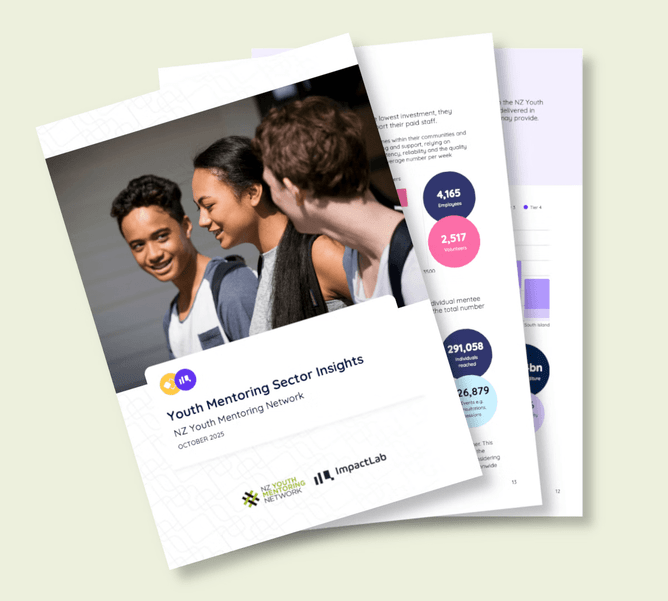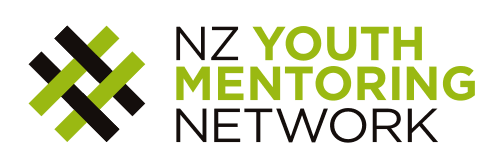The Youth Mentoring Sector Insights report is a first-of-its-kind study into the scale and delivery of youth mentoring in Aotearoa. It was designed to help us understand just how widely youth mentoring is being used and provides some useful indicators for how we might improve this picture.
You can now download the full report here.
There are several important ideas that surface in the data, and which align with our experience speaking to providers around Aotearoa:
Youth mentoring is delivered in a wide variety of ways around the country and is often a very localised response by a community to a specific need that they have identified.
The majority of mentoring providers are relatively small (tier 3) charities with only a few full or part-time employees, usually supported by volunteers.
The high number of Māori engaging with mentoring services shows the importance of culturally appropriate training, adapted to or created here in Aotearoa.
Mentoring services skew heavily towards those under 15. Older cohorts appear to receive very little mentoring by comparison, although anecdotally and in policy discussions this group is seen as being in high need of more support.
Meanwhile, the deeper analysis afforded by the GoodMeasure data we've been able to access in this report allows us to see the specific impacts of mentoring with more clarity. This is important, as while mentoring is widely appreciated it is not always well-understood. The good measure data provides insight into the costs, scale, and immediate efficacy of some of our country's more substantial mentoring programmes.
‘Mentoring’ covers a lot of ground
It is important to remember that mentoring is not simply a crisis response or a way to ‘fix’ a problem, rather it is a means of growing and supporting young people. As a vehicle for improved youth wellbeing, it must be adaptable to ‘high risk’ young people, ‘high achievers’, and of course all those in-between.
A consistent message seen in other reports such as the Mahi Tūturu research and Addressing Youth Mental Distress in Aotearoa New Zealand is the need for more well-trained youth mentors. But what does that actually look like in this context?
What we’ve learned from this study is the need to nurture and support a diverse range of mentoring providers. There is no ‘one-size-fits-all' way to mentor young people and localised and specialist programmes should in-turn be supported with appropriate training, connections and resources.
It is a simple message: effective, intentional mentoring must be backed by well-trained and supported people and adapted to local conditions. Where smaller organisations struggle to provide their own training, consistent delivery of professional development by groups such as NZYMN is essential.
The network effect
What we've learned from kōrero with our network is that these smaller organisations can often feel that they’re doing it on their own. Given the diversity mentioned above, and the very local conditions under which these organisations operate this is no surprise. However, one of the top responses we receive from attendees at our training workshops – when we ask what they’re hoping to get out of the training – is the chance to network with others in the sector.
Youth workers, teachers, and others that we train also tend to move regularly between employers and locations. Building a strong network provides resilience for workers in this context, and it also spreads their professional learning among a broad number of colleagues.
Our goal is to further connect organisations with one another so that shared lessons in programme delivery and management create a form of ‘sector resilience’ - ensuring services can be delivered safely & effectively wherever they are located.
Better data = a clearer picture
Data collection for this report was problematic. While we knew that we had good data available in the GoodMeasure reports provided by ImpactLab and their clients, more general data from organisations around the country was inconsistent. As a response to this, we have generated a list of five questions that organisations might want to answer in their SSP each year so that we can shape a clearer picture of mentoring in Aotearoa.
Among other things we feel must be measured is the total volunteer contribution. Most organisations are running extremely efficiently, with low rates of pay for those who are employed, many services & goods donated, and most work carried out by unpaid volunteers.
Recording this work can show funders (either private or government) just how cost-efficient these services are for the benefit they deliver. It also shows just how much bigger the youth mentoring sector is than the annual financial accounts would suggest.
This improved data, in turn, will allow us to make arguments in our advocacy about how more funding will also make these services more effective.
Some impact defies measurement!
There are some things that we accept are almost impossible to measure: the quality of a mentoring relationship and its long-term impact on wellbeing is just one of them. While this report is therefore limited in scope, we hope that it can work in conjunction with anecdotal testimonies to paint a clear picture of a timely and powerful method of supporting our young people.
Improve your data!
We know that youth mentoring is often delivered alongside or as part of other programmes, but our hope is that some youth mentoring specific data can be reported on in your organisation's Statement of Service Performance. Doing so will lift the quality of data, and our understanding of youth mentoring, year on year.
Here are our thoughts about specific figures you might include:
How many young people did you support with mentoring during the period?
How long is your mentoring programme?
What percentage of mentees completed it?
How many volunteers supported this programme?
How many hours of support did volunteers provide?

